August 2025 Watch Part 1
Friday, 15 August 2025
I won’t lie: I was going to wait to post my responses this month as a single post, but I’m so excited to check out if this code I’ve been working on works or not that I finished three reviews in one night. I’ve spent most of this month so far procrastinating the rest of my dissertation—I’m two drafts in and about to start to edit the third. It’s been a long summer and I honestly haven’t taken many breaks, but I’m nearly done! So if you notice this isn’t edited, that is why.
In the meantime, I’ve been getting by with working on my website, packing to move, and becoming really obsessed with my new(ish) original characters. I’ve never really been an OC person, not out of lack of interest but just because I haven’t really had a good enough hook to really devote myself to in my free time without making it an actual project. But this is perfect because there’s a whole storyline and cast but no actual pressure to write the actual story. And, most importantly, it involves a whole lineup of cute historical-inspired costumes, which is obviously the best part of drawing anything.
Mullholland Drive (2001, dir. David Lynch)
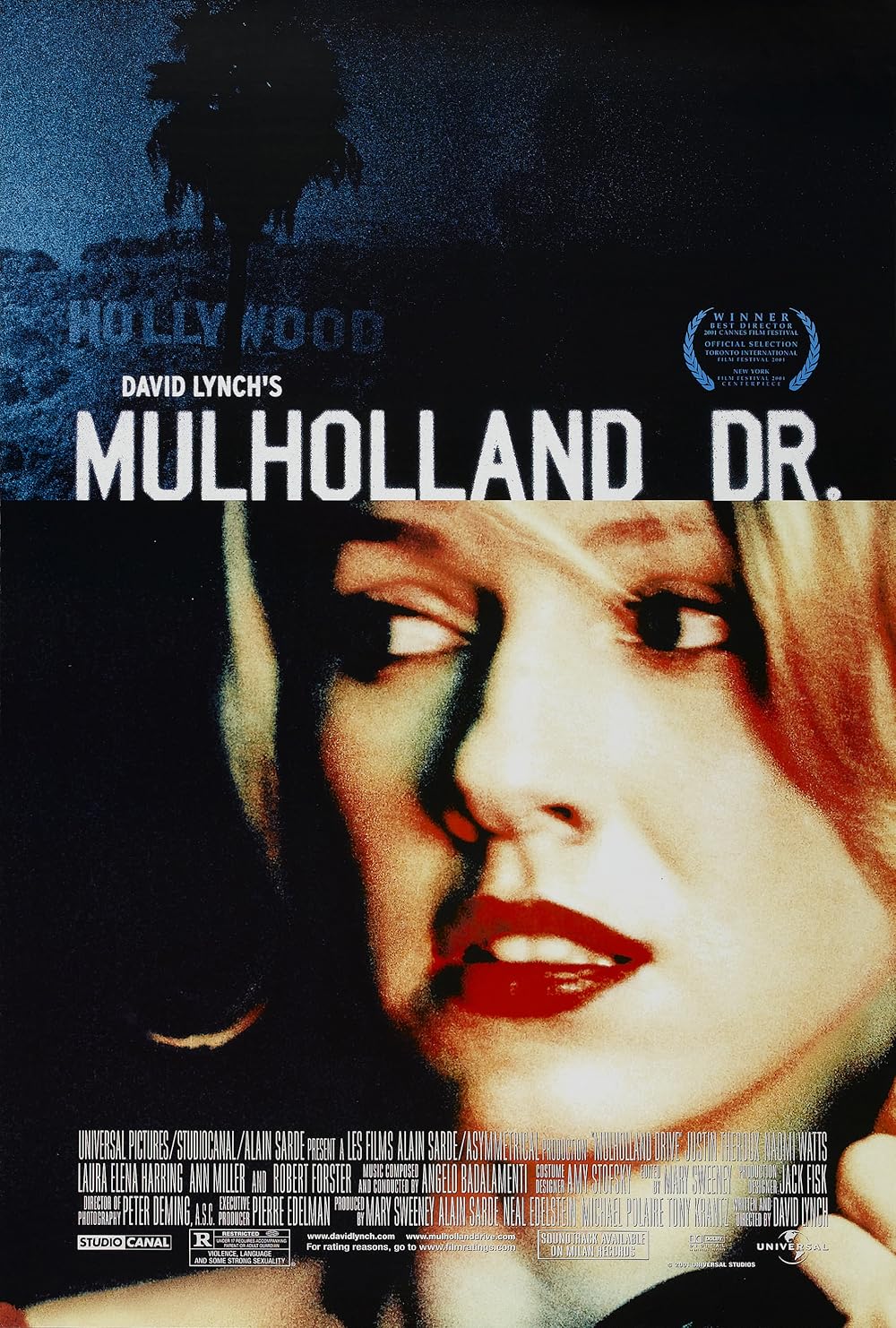
Mulholland Drive is David Lynch’s 2001 surrealist neo-noir that involves a dreamlike narrative surrounding the victim of a car accident and the woman who takes her in, an extended yet occasionally opaque portrayal of the allure of Hollywood, and a recurring motif of a blonde bob (the haircut).
First of all, I love the surreal noir style of this movie—the ambience and especially the speed is so refreshing and I’m a huge fan. It works with the stylistic elements of noir in a way I tend to look for, here bringing in that dreaminess particularly in performance and tone. You see this in the way the characters speak to each other, which is also just characteristic of everything I’ve seen of Lynch, but it also takes on interesting contrast with how the characters talk. There is this one point where the director of the movie within the movie is discussing how “There's six of the top actresses that want this [role].” The utter nonspecificity of the dialogue is just so charming and off-putting and contributes to that dreaminess. I think it pairs so nicely with the surrealism of this story, although it was the intensity of the dreamlike aspect that caused me to struggle with it.
It’s always unexpected to me, as I love dreams and dreamlike tones so much, but I admittedly tend to have difficulty when the narrative is too overtly about that sort of twisting in time and topic, like in this case. It’s not a matter of it being too hard to follow—perhaps only so because I went in with that as a warning—but moreso it presents a challenge to parse out significance from. This is not inherently a problem, of course, and not only do I find myself struggling with it less as the days pass, but it’s also an intentional aspect of the filmmaking. But I admit I take a moment like the “silencio, no hay banda” series of scenes (easily my favorite moment in the movie) and I want to pull it apart and see what’s inside. Although the use of dreamworld elements occasionally bordered on the intense, they were used quite thoughtfully in terms of themes of the film, which I think is why I have a more favorable opinion toward them a few days later.
Asteroid City (2023, dir. Wes Anderson)

Asteroid City is a 2023 sci-fi comedy drama comprised of a small series of frame narratives that create an emphasis on production in the midst of a story about a group of people isolated after an alien sighting.
Early on in this movie I determined it was made with me in mind: it takes place in the desert, deals heavily with theatricality, and brings in sci-fi elements to a narrative that does not take on the genre-typical beats of sci-fi. Originally curious how these elements would fit together and later disappointed at how they did, I fear this movie does not quite cohere in the way I hoped it would. To some extent, this is clearly intentional—there is a lack of resolution that seems deliberate, but does not manage to say anything with its ambiguity. I’ll talk a bit more on the elements that didn’t quite work for me and why, which will hopefully illuminate more of what I mean.
Wes Anderson is obviously more than familiar with the frame narrative although I have in the past struggled with the intention and use behind them. Obviously the primary motivation often seems to be the deliberate playfulness with artifice and distance of the story and his style, but this film takes it to the next level and spends ample time wading about the frame story. It does so in an interesting way: it makes the events occurring in Asteroid City part of a play, and we see the production from writing to casting to first performance interspersed with scenes in the desert. It focuses on the writing at the start, the literal elements of the written page as they are translated into multi-dimensional form, first on stage and then on camera. But the piecing together of the intention behind this frame was so slow during the movie, and the way it culminated at the end felt out of nowhere, with little knowledge of the characters in the climax but one, so this well-written and performed moment felt out of nowhere.
I’ll come back to that idea, but first I want to touch on the disconnect of themes between the frame narrative and desert plot. Despite the shared actors, I never really felt the connection between them. Not only that, but the actual narrative happenings of the desert plot fell flat for me, despite making up the bulk of the movie. Specifically the quarantine aspect didn’t work, which I found to be an issue with execution rather than concept. The feeling of the quarantine never really translated, despite the clear inspiration for the movie. What’s more, I could not piece it together with the play frame, which seemed entirely disconnected—I wasn’t certain that anyone working on the “play” had any idea what it was about, as it served no place in their life even worthy of reference. I’m not suggesting major parallels or anything, but what is the thematic link between these scenes we’re going between?
To return to the climactic moment, occurring within the play frame, I first must announce a major caveat: I don’t want to rewrite the film or its execution, but I also know exactly what fell flat about it for me, aside from the disconnect, although that plays a role as well. Essentially, the relentlessness of the style and distance made what I felt was a pretty solidly written climax, fall flat. You get a moment of reprieve from the performance of the film with the close-ups, but they’re still really distant and it never breaks the artificial wall that has been created in the framing. There is a huge element of distance—dare I argue psychic distance?—with this movie that’s very competently communicated with both performances and framing. You see it best with how Augie and Midge speak to each other through windows, across a small patch of land. In a movie that is so metatextual, so interested in its own artistry in even the text of it, in literally communicating faux mistakes in the editing and at times the script—it all just sort of falls flat. And to an extent that is very clearly the goal, the lack of resolution and feelings of purposelessness. But it’s not in a way that’s significant or poignant. My feeling about the ending was, “well, whatever.” Perhaps I built it up too much in my head, hoping for the ending to wrap everything up because it very much was not wrapped up in the rest of the runtime. But this movie just does not come together at all—and I mean that thematically, not narratively.
Companion (2025, dir. Drew Hancock)
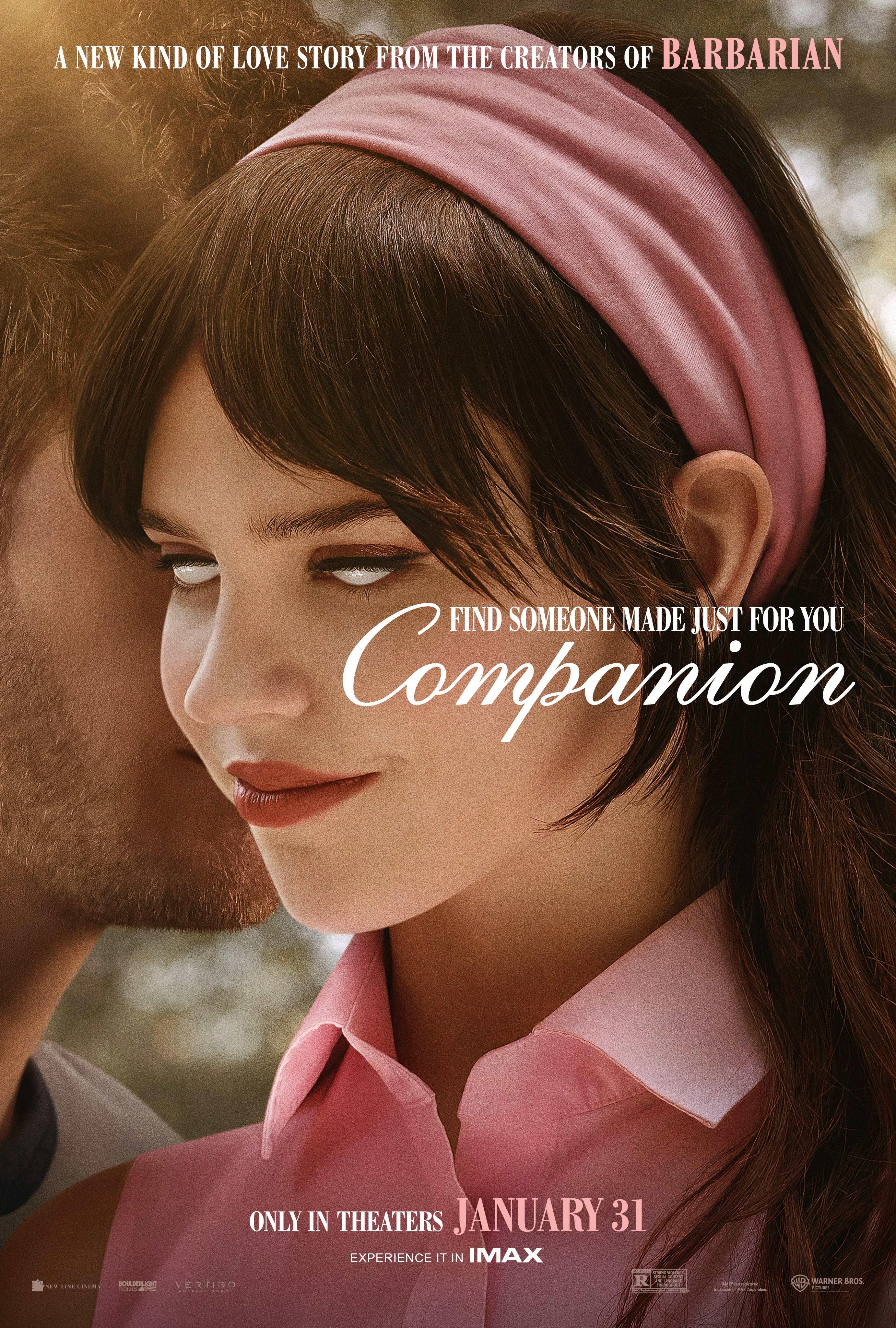
Companion is a newly released sci-fi film with a classic plot about, as the title suggests, a companion robot. It’s unique angle, however, is that we follow that robot’s perspective as she discovers the truth about herself and her life, all while her ex-boyfriend and his friends are trying to kill her.
So for reference, I’m trying to get more into sci-fi, especially sci-fi horror/thriller. I was excited by the premise of this, despite the fact that I’m usually super bored by robot wife/companion movies—to an extent where I have toyed with writing an essay about them. Unfortunately this movie falls into the same pitfalls as the others I’ve seen. It’s not that they have bad concepts in terms of narrative or are meaningless thematically (usually quite the opposite, actually), but that they’re just really boring. The way this was described to me made it sound like there could be something interesting and engaging here, but that was not the case.
I’m not exactly sure where to center the issue, but I would hazard a guess that the perspective was a pretty big obstacle. Most of this movie is presented from Iris’ (the robot) point of view, which is captivating on the tin, until you realize she is utterly clueless of what’s going on. That’s fine, except when we have to watch her boyfriend explain to her the truth in explicit detail. Not only does it seem weird for him to do and we never really figure out why, but I’ve known that for the last twenty minutes. I did absolutely no research on this film, even watching a trailer—I didn’t know Jack Quaid was in it as a main character until I started watching it—but I knew from the title of the movie. There’s a similar moment later that I believe is supposed to be a twist. By then the psychic distance has let up some, but it’s something that’s so easily known in the first few minutes of the movie that I did not find it to be one. It’s not that a twist is bad if you guess it, but it highlights an issue of this movie being so cookie cutter narratively that unless you love this type of film, or have never seen one, it’s pretty boring pretty quickly.
Also this is such a random note, but it genuinely really impacted my experience of the movie. I don’t think it’s my device because this isn’t happening with other video/audio files, but the audio seemed so poorly balanced. I’m lucky that I watch with subtitles, because semi-important pacing elements would’ve fully been unknown to me without them—like, it wasn’t just quiet. I didn’t hear some of these lines at all, specifically those when characters are off-screen talking. I just don’t think this was the movie for me.
El secreto de Marrowbone / Marrowbone (2017, dir. Sergio G. Sánchez)
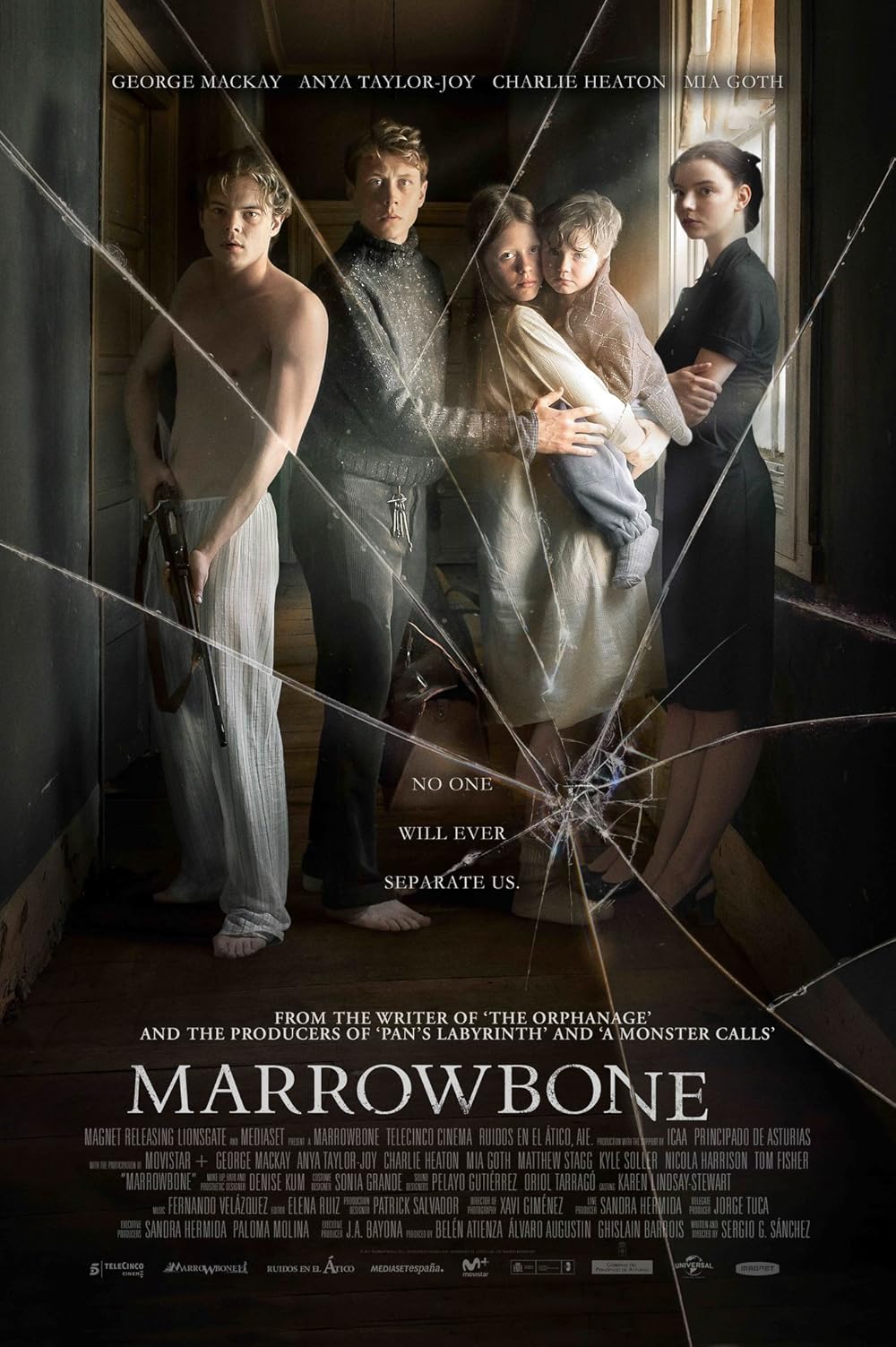
Marrowbone is a 2017 drama-horror film that takes on the form of a ghost story. The Marrowbone siblings move from England to the US, fleeing a mysterious past, only to have their mother die early on. They promise to remain hidden until the eldest sibling is of age to legally care for them, but something sinister lurks in their home.
I loved the concept of this movie and the tension throughout. Ghost story/haunted house films can be a struggle for me—I feel like they often drop the ball in the climax (...Hold that thought). But this movie created such strong tension as the haunting was very slight, slowly ramping up, but when it did… I don’t even have words. The scene with Sam and the ghost in the mirror was so terrifying and excellent, and thinking about it in retrospect is even more satisfying. The mystery of what exactly happened with their family made me so intrigued; this was a case of I mostly figured it out, but the reveals were so careful and captivating that it didn’t matter.
However, the twist of the last third(ish) of the movie made me so upset. I just sort of sat there going “What??” over and over. It makes total sense in retrospect but I felt so short-changed. Related to that, the climax lost me a little; we spend most of the movie in Jack’s perspective and quite suddenly we’re in Allie’s. This makes sense narratively why it shifts and to whom it shifts, but I felt we didn’t know Allie well enough to really feel for her in these moments. It was satisfying in the sense that I did not guess this at all and I was fully willing to take the movie for what it was; but also, you could look back and see the truth for a good portion of it. There is some clever filmmaking that I argue borders a bit on dishonesty, but it works retrospectively so I’ll allow it.
Den stygge stesøsteren / The Ugly Stepsister (2025, dir. Emilie Blichfeldt)
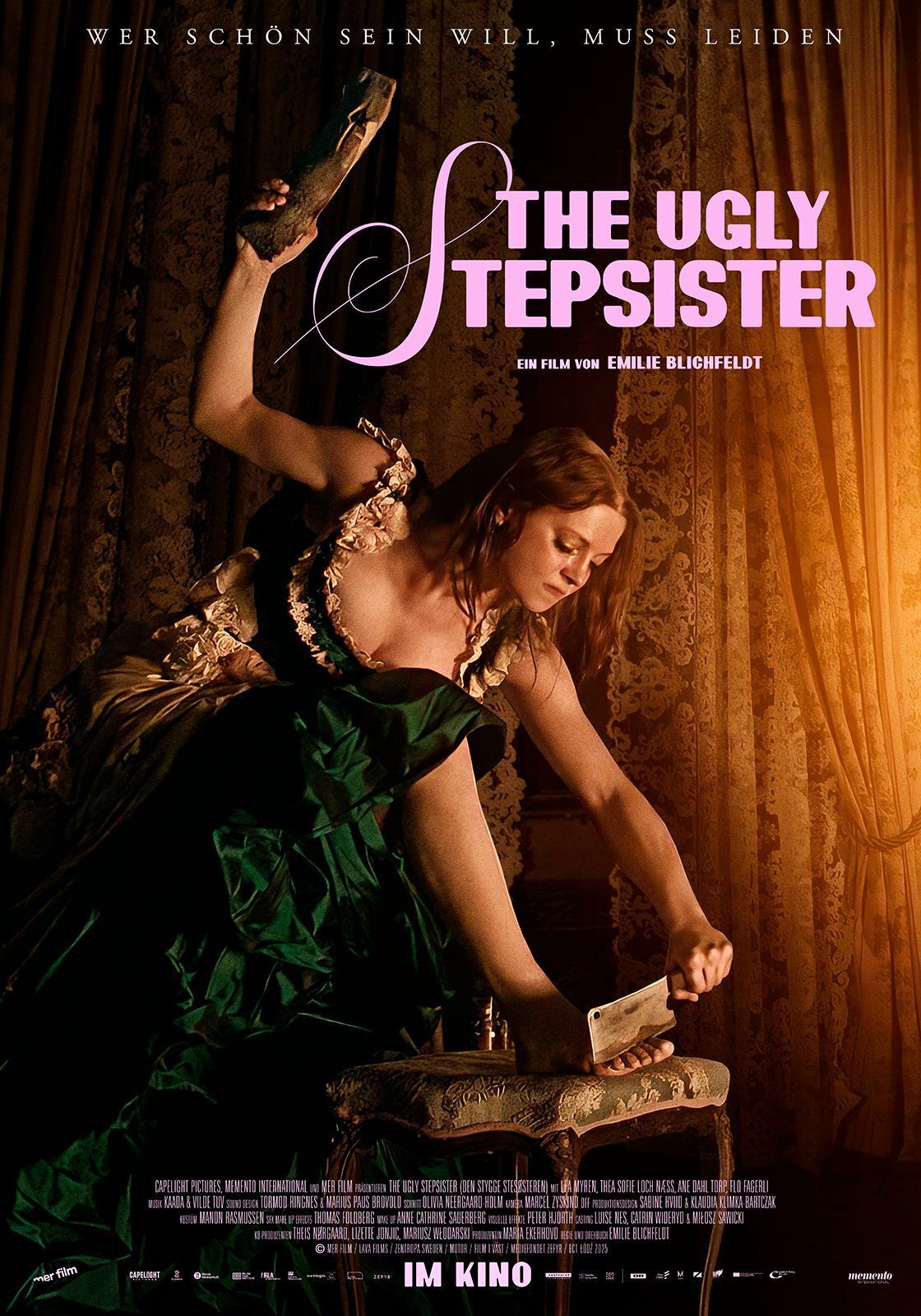
The Ugly Stepsister is, as the title implies, a Cinderella retelling from the perspective of one of her stepsisters. The notable reason for this is that the film functions as a critique of the beauty industry and the standards that enable it.
So right off the bat I was a bit nervous for this move. I love movies that are inspired by fairy tales in terms of their aesthetics/iconography and tone, but actual fairy tales rarely compel me as narratives. However, it came as a suggestion from Girl on Film on YouTube, who is not only an excellent video essayist but also whose taste in films is appropriately similar to my own such that I feel quite confident taking her suggestions.
As I mentioned, I was worried about the plot itself being substantial enough to retain my attention, but it turns out that was unfounded. There were a few deviations from the story I’m familiar with, but ultimately it still followed a pretty simplistic narrative. It was paced well enough that we got to spend time with each moment, but not so much that it droned on. One thing that piqued my attention was the moments of silence and the slowness of the dialogue. It created this really distinct sense of communication that contrasted with more quick, high energy moments, like the dinner the night of the wedding.
Of course, I would be remiss not to mention the visuals of this movie. It is so gorgeous. It has this stylized historical setting that is instantly captivating, then spends the rest of the movie gloriously juxtaposing this rich, beautiful style with gross, freaky moments that made my stomach churn. If you haven’t seen the movie, I worry this comes across as potentially generic or uninspired but I have to insist it comes across as so artful and deliberate. It makes its critique so masterfully, but as I find especially important with a topic that so deeply works its way into people’s mind, it is simultaneously sympathetic. Essentially it is a great film and I can’t wait to see what else Blichfeldt has in store.
Alien (1979, dir. Ridley Scott)

Alien is a 1979 sci-fi horror in which the crew of a spacecraft is hunted by an alien. This movie is so big in the public consciousness that I feel like I don’t really need to explain it anymore than that. I briefly debated including a list of facts I knew about it going in, but it was genuinely way too long. This film simultaneously draws on so many works of science fiction and in turn inspires so many more; it is such a work in the public consciousness that I’ve had trouble narrowing all my thoughts about it.
I feel like I have to start with the excellent aesthetic of this movie. It’s so cool and classic, and the juxtaposition between the Nostromo and the alien spaceship is really neat. The use of the environment to hide the alien creates this great tension that really characterizes this era of film. With that said, while it was tense, I failed to find it particularly thrilling or horrifying. Instead, I kept remarking on my appreciation for the visual style, though not necessarily the visual meaning. The movie faced a similar problem with the characters, which is that while they worked on the tin, in practice they did not compel me as much as I would’ve liked.
There is actually very little for me to say about this movie; I knew so much about it beforehand it almost felt like a rewatch except for one major element that was utterly shocking to me—the robot. Aside from this, I could’ve told you before I watched this pretty much every major beat, and even those I couldn’t, I think I could’ve reasoned it out. But the inclusion of the robots and the implication of how he got there was really unexpected and honestly incongruent with the rest of the film. This was not because it wasn’t properly set up, because to some extent I think it was, but because it was so unexplored. It created all these implications that were not really unpacked. Obviously I know from where I’m watching there are a handful of sequels that likely discuss the topic, but it left this huge feeling of being unresolved that I think could’ve been really interesting in conversation with the sort of plot this movie has. Also, I deleted a huge rant about the use of “The Company,” as a nonspecific body and what I think it does for themes of labor and such, but just know that it did catch my ear.
The Gilded Age, Season 3 (2025, created by Julian Fellowes)
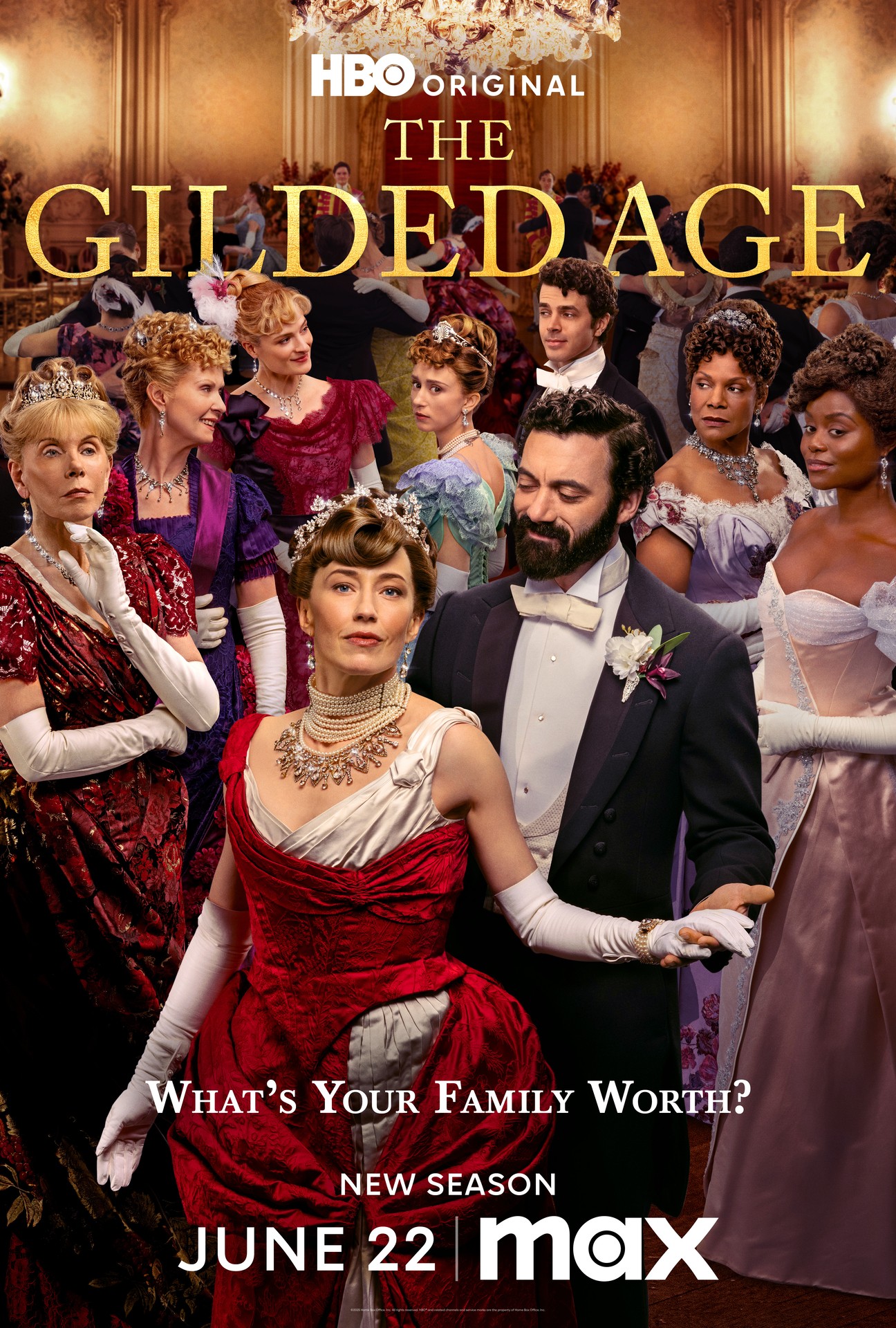
The Gilded Age is a period drama set in 1880s New York that navigates the social scene, focusing on tension between the old and new money families, the Russells and the van Rhijns, who live across the street from each other.
The third season of the show naturally builds on the other two, but it comes in with a fresh and exciting set of conflicts to deal with. They were so fresh, in fact, that I almost felt like the show had been holding out on me. Previously it had the classic Julian Fellowes feel of nothing ever happening and such drama at completely insignificant moments, but this season completely changed all that. It brought in some great and deeply interesting storylines—and also Aunt Ada’s. Peggy’s storyline this season was easily my favorite, although finally getting to see Mrs. Russell and Mrs. van Rhijn really have to confront difficult situations in their life was my bread and butter. When people online talk about seeing their favorite character like sopping wet, that’s me with uncompromising, ambitious women in spots of relative power suddenly being forced to confront the very situation that made them those things. First of all they should never be tasked with that but when they are and their eyes get all teary??
All right, nerdy gushing over, but that is kind of how I felt this whole season. This show doesn’t really have the wit of other period dramas, so you sort of have to be in it for the (really, really) gorgeous costumes and the gushy conflicts. The rest of my notes are incoherent rambles about my feelings about each situation—like how poorly Bertha was treated and the absolute journey I went on with Marian this season—so I’ll cut it off there. I’ve realized this summer that it can be pretty difficult to review a new season of a show I already like when it gives just more of the same.
